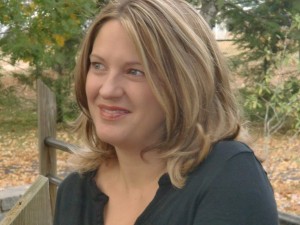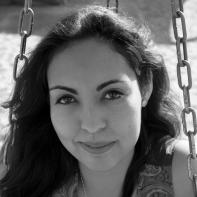 Julie Hensley grew up on a sheep farm in the Shenandoah Valley, but now she makes her home in Kentucky with her husband (the writer R. Dean Johnson) and their two children. Julie has won The Southern Women Writers Emerging Voice Award in both fiction (2005) and poetry (2009). Her work regularly appears in a variety of journals, most recently in Redivider, Ruminate, Superstition Review, PoemMemiorStory, The Pinch and Blackbird, and has been nominated for the Pushcart Prize. Her novel-in-stories, Landfall, won the 2007 Everett Southwest Literature Award. Her chapbook of poems, The Language of Horses, is available from Finishing Line Press.
Julie Hensley grew up on a sheep farm in the Shenandoah Valley, but now she makes her home in Kentucky with her husband (the writer R. Dean Johnson) and their two children. Julie has won The Southern Women Writers Emerging Voice Award in both fiction (2005) and poetry (2009). Her work regularly appears in a variety of journals, most recently in Redivider, Ruminate, Superstition Review, PoemMemiorStory, The Pinch and Blackbird, and has been nominated for the Pushcart Prize. Her novel-in-stories, Landfall, won the 2007 Everett Southwest Literature Award. Her chapbook of poems, The Language of Horses, is available from Finishing Line Press.
Superstition Review: What inspired you to write The Language of Horses?
Julie Hensley: My girlhood, like so many, was marked by a period of intense love of horses. When I was very young, my three sisters and I took riding lessons. Saturday mornings, we dawned jodphurs and leather boots, rode around and around a ring of sawdust, and then stopped at Seven Eleven for Slurpees on the way home. When I was nine, after much waiting and saving, my parents bought a farm. Finally, we had our own horses. We could ride them on the overgrown trails that snaked out through the woods behind the barn. We could lounge bareback with a book while the horses grazed.
For my mom, this move marked the fulfillment of her own childhood wishes. Every Christmas, she told us, she had begged her parents for a horse, but had to settle instead for a string of Breyer ponies. Her yearning for horses was a palpable part of my childhood, and as an adolescent, I began to recognize in the fulfillment of that yearning, its metaphoric power. It wasn’t surprising that our move to the farm heralded my mother’s return to college and her development of a career as a teacher. Horses were desire. They were imagination. They were autonomy. They were the things that, I was just then beginning to understand, women ultimately have to fashion for themselves.
SR: The poems have very vivid memories and stories. Are they connected to your own personal memories and what made you want to share these certain moments?
JH: The poems are highly autobiographical. My husband Bob (R. Dean Johnson), who himself writes nonfiction, loves to tease me when I give him a new poem to read. He says, “Huh. Why don’t you take the line breaks out of that and submit it to Brevity.” While there is usually a narrative moment to my poems, and these are no exception, it is not story as much as raw, highly sensory imagery which spawns a poem for me. For instance, while “Monsoon Season” recounts the memory of a hike Bob and I did in the San Francisco Peaks, the poem really began with the immediate smell of vanilla rising from wet pine bark.
Once I realized horses could work as an extended metaphor, I did begin actively siphoning imagery around that theme, which led to specific memories such as my sister teaching me to French braid on a horse’s tail.
SR: In your fiction piece, “Expecting,” your descriptions are still very poetic. Is writing fiction more of a challenge for you compared to poems?
JH: I would have to say that fiction is harder for me. Or perhaps it is more fitting to admit that I simply work harder at fiction. My MFA is actually in fiction. Poetry has always been my secondary genre. Because I teach, I dedicate summers to fiction–for several summers in a row, I have been trying to complete a novel. When I feel hung up on the fiction, rather than sitting and fuming with creative wheels spinning, I will open a new file and begin a poem. During the academic year when I teach four classes at a time, it is difficult to drop fully into the world of my fiction, so during the winter I revise fiction and write new poems. I’m grateful to have my poetry because moving back and forth between the two genres releases pressure.
SR: The Language of Horses brings the reader to many different beautiful settings like Virginia, Kansas, and Phoenix. What does traveling offer to the pieces you write?
JH: It’s funny. My dreams take a while to catch up with my actual life. For instance, I have a nine-month-old daughter, but she has yet to appear in my dream life. I moved to Kentucky three years ago, yet my home here has really only just begun to formulate the backdrop of my dreams. I think my writing life works the same way. When I was a student in Arizona I constantly wrote of Virginia and Kansas. When I moved to Oklahoma, I wrote about the desert. Now that I live in Kentucky, I have begun to write about the plains. For me, being away from a place breeds a yearning that is quite productive to the creative process. I like to cultivate that yearning, to play with the power of dislocation.
I think that’s part of the power of low and brief-residency MFA programs such as the one in which I teach at Eastern Kentucky University—they allow emerging writers to feel the beautiful strangeness of a new place and the warm yearning for home that accompanies it. Two years ago, I traveled with students to San Miguel de Allende, Mexico, and I actually crafted “Expecting” there, sipping espresso each morning in Café Montenegro. This summer, I’ll accompany students to Edinburgh, Scotland. Maybe that trip will help me make progress on my novel.
SR: What are you writing now? What are you reading?
JH: It’s winter, so I’m writing poems. I’m working simultaneously on two cycles. One, with the working title Viable, explores motherhood and fertility. The other, Breaking Ground, channels the voices of a fictional couple—Gracie and Nohl—whose marriage dissolves into physical abuse as they build a farmhouse together.
I just finished Jennifer Egan’s A Visit from the Goon Squad, a book which absolutely blew my mind. In general, I’m a fan of novels-in-stories. (“Expecting” is actually the capstone piece in Landall, a novel-in-stories which I have just begun to circulate.) Egan’s novel is so imaginative. She inhabits the lives of an array of characters so fully, and she balances decades of branching relationships with such flawless, nuanced control. I just began and am thoroughly enjoying Nancy Jensen’s The Sisters, a sweeping novel that moves, through six different perspectives, from 1920s Kentucky to Vietnam era Indiana. I’m also reading collections of poems in preparation for a poetry workshop I’ll be teaching in the spring—this week it’s Beckian Fritz Goldberg’s Lie Awake Lake and Claudia Emerson’s Figure Studies.
 Today we are pleased to feature author Ruben Rodriguez as our Authors Talk series contributor. Ruben discusses the three poems which were published in Issue 18 of Superstition Review.
Today we are pleased to feature author Ruben Rodriguez as our Authors Talk series contributor. Ruben discusses the three poems which were published in Issue 18 of Superstition Review. I have been thinking about the ways in which musical and verbal intelligences merge in a poem as compositional strategy, because I have wanted to understand how a poet “thinks” through the music of the poem, as distinct from stating a thought directly as an abstraction or translating it visually into imagery. What interests me is the way a poet puts sonorous “truths” in play. These “truths” are not always articulated thematically in the poem, but the poem’s music gives rise to them, in the musical supplement to signification that Northrup Frye called the “babble” of poetry.
I have been thinking about the ways in which musical and verbal intelligences merge in a poem as compositional strategy, because I have wanted to understand how a poet “thinks” through the music of the poem, as distinct from stating a thought directly as an abstraction or translating it visually into imagery. What interests me is the way a poet puts sonorous “truths” in play. These “truths” are not always articulated thematically in the poem, but the poem’s music gives rise to them, in the musical supplement to signification that Northrup Frye called the “babble” of poetry.
